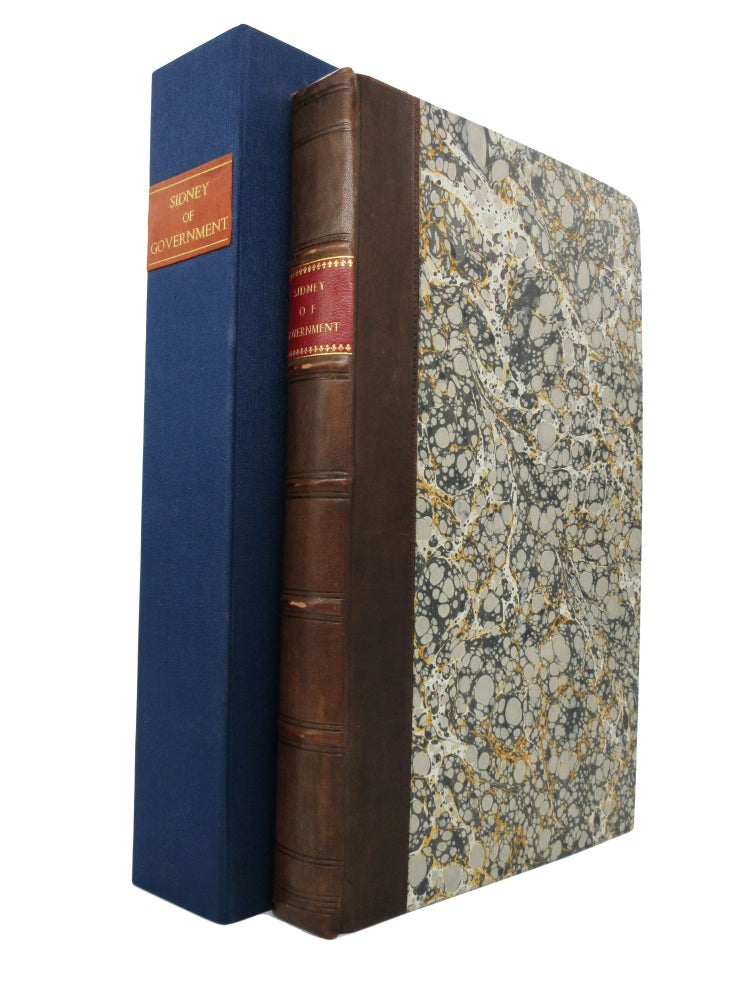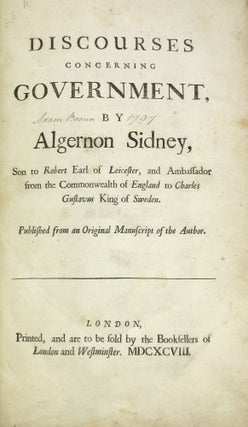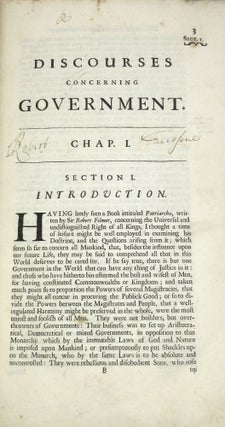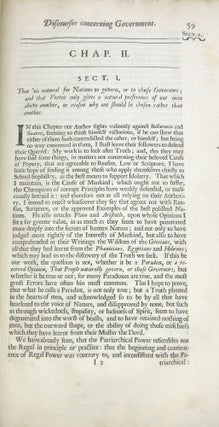Discourses Concerning Government; Published from the Original Manuscript of the Author
London: Printed, and are to be sold by the Booksellers of London and Westminster, 1698. First edition. Folio (310 x 200 mm). Modern brown quarter calf, red morocco spine label and raised bands, with marbled boards, edges sprinkled red. Comes in a blue, flat-back cloth box. Ownership signature of “Adam Brown, 1797,” and shelf mark to title page, several annotations and ink marks to contents, including sig. 302 verso. Contents occasionally spotted with small nick to top edge of S4 and short closed tear to lower edge of 2V2, else a very bright and clean copy housed in a nice custom box. Item #91
First edition of this major work of republican theory by English politician and republican theorist Algernon Sidney (1623–1683). Sidney wrote his Discourses Concerning Government between 1681 and 1683, and it originally circulated in manuscript form as a polemical refutation of Sir Robert Filmer’s Patriarcha (1680), which defended the divine right of kings under absolute monarchy. Sidney opposed absolute monarchy as a political evil and defended the right of individuals to choose their own form of government. Sidney further argued that the people retain the right to abolish any government that becomes corrupt and to form another. Sidney’s powerful defense of republicanism and the right to armed resistance in the Discourses placed him alongside his famous republican contemporary, John Milton, as a master of republican eloquence. Together with John Locke’s Two Treatises of Government (1689), the Discourses exercised a profound and decisive influence on revolutionary America, and was hailed by Thomas Jefferson as the “intellectual foundation of the Declaration of Independence.” Sidney was ultimately executed, in part, on account of his having written the Discourses. On June 25, 1683, an arrest warrant was issued for Sidney on account of his alleged role in the Rye House Plot to assassinate King Charles II of England and his brother, and heir to the throne, James Duke of York. In addition to arresting Sidney, English authorities confiscated copies of Sidney’s Discourses in support of the allegations against him. English law required that at least two witnesses be brought against him. Accordingly, at his trial on November 7, 1683, the Crown produced baron William Howard as its first witness and, as a second witness, Sidney’s own Discourses (“to write is to act”). Sidney was found guilty and thereafter beheaded on December 7, 1683. He would live on, however, as a Whig hero and martyr, and his Discourses would profoundly influence Continental and American revolutionary thought. Indeed, many consider the Discourses to have had a more profound impact on the American revolutionary mind that even the works of John Locke. Thomas Jefferson was among the founding fathers and revolutionaries who were greatly influenced by Sidney’s Discourses, believing it to be a “rich treasure of republican principles.” For Jefferson, it was probably “the best elementary book of the principles of government, as founded in natural right, which has ever been published in any language.” This beautiful first edition folio is a truly monumental work of historical and political importance.
Price: $6,000.00




